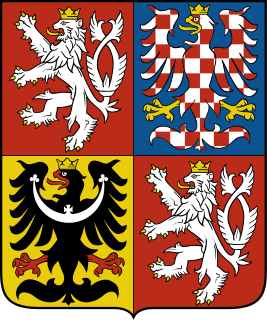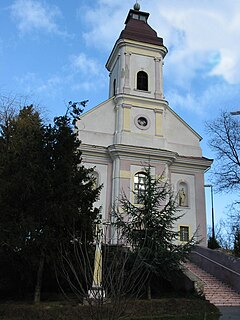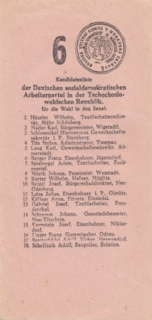
Nové Zámky is a town in southwestern Slovakia.

Uzhhorod, Rusyn: Уґоград, translit. Ugohrad, also Rusyn: Ужгород, translit. Užhorod) previously and historically known as Ungvár is a city located in western Ukraine, at the border with Slovakia and near the border with Hungary. It is the administrative center of Zakarpattia Oblast (region), as well as the administrative center of the surrounding Uzhhorod Raion (district) within the oblast. The city itself is also designated as city of oblast significance, a status equivalent to that of a raion, and does not belong to Uzhhorod Raion. Population: 115,163 (2016 est.).

The Parliament of the Czech Republic or just Parliament is the legislative body of the Czech Republic, seated in Malá Strana, Prague.

Gbelce is a municipality and village in the Nové Zámky District in the Nitra Region of south-west Slovakia.

Svodín is a village and municipality in the Nové Zámky District in the Nitra Region of south-west Slovakia.

Parliamentary elections were held in Czechoslovakia on 18 and 25 April 1920. Voting for the Chamber of Deputies occurred on April 18, 1920, and the voting for the Senate was held a week later on April 25, 1920. The election had initially been planned for mid- or late 1919, but had been postponed.

Parliamentary elections were held in Czechoslovakia on 27 October 1929. The result was a victory for the Republican Party of Farmers and Peasants, which won 46 seats in the Chamber of Deputies and 24 seats in the Senate. Voter turnout was 90.2% in the Chamber election and 78.8% for the Senate.
The Hungarian-German Social Democratic Party was a social democratic political party in Slovakia. It was founded in 1919 by social democrats from ethnic minority communities. The party had a German and a Hungarian section. The German and Hungarian social democrats in Slovakia had developed an antagonistic relationship with the Slovak social democrats, who had merged into the Czechoslovak Social Democratic Workers Party as Austria-Hungary was broken up after the First World War. Issues of contention between Hungarian/German and Slovak social democrats included views of the February Strike of 1919 and the Hungarian Soviet Republic.
The Jewish Party was a political party of the First Czechoslovak Republic. It was founded in 1919 by the Jewish National Council in Prague. It was the strongest Jewish political party in the interwar Czechoslovakia although many Jews were rather active in non-Jewish parties, be they Czech, German or Hungarian. The party adopted a Zionist political program and succeeded in influencing the Czechoslovak government to acknowledge Jews as an official national minority in the constitution of 1920.
The German Electoral Coalition was a political alliance in Czechoslovakia representing Sudeten Germans.

The Česká Lípa 5th electoral district was a parliamentary constituency in Czechoslovakia. It was one of two parliamentary constituencies with an overwhelming ethnic German majority amongst the voters. The Česká Lípa 5th electoral district elected 13 members of the Chamber of Deputies. In February 1921, the Czechoslovak authorities estimated that the electoral district had a total population of 564,449.

Elections for deputies to the Czechoslovak parliament from the Užhorod electoral district were held on 16 March 1924. Nine members of the Chamber of Deputies and four senators were elected.
Josef Kaminský (1878–1944) was a politician in interwar Czechoslovakia. He died in 1944. He worked as a newspaper editor. He was elected to the Czechoslovak Chamber of Deputies in the 1924 Užhorod electoral district by-election, the sole candidate of the Carpathian Republican Peasants Party elected.

Parliamentary elections in the First Czechoslovak Republic were held in 1920, 1925, 1929 and 1935. The Czechoslovak National Assembly consisted of two chambers, the Chamber of Deputies and the Senate, both elected through universal suffrage. During the First Republic, many political parties struggled for political influence and only once did a single party muster a quarter of the national vote. Parties were generally set up along ethnic lines.

The Těšín electoral district was a parliamentary constituency in the First Czechoslovak Republic. It was set up ahead of the April 1920 parliamentary election in an area that both Czechoslovakia and Poland claimed as theirs. No vote was held there in 1920 and the constituency was abolished before the 1925 parliamentary election.

The Nové Zámky 16th electoral district was a parliamentary constituency in the First Czechoslovak Republic for elections to the Chamber of Deputies. The seat of the District Electoral Commission was in the town of Nové Zámky. The constituency elected 11 members of the Chamber of Deputies.

The Carpathian German Party was a political party in Czechoslovakia, active amongst the Carpathian German minority of Slovakia and Subcarpathian Rus'. It began as a bourgeois centrist party, but after teaming up with the Sudeten German Party in 1933 it developed in a National Socialist orientation.

The Jihlava 10th electoral district was a parliamentary constituency in the First Czechoslovak Republic for elections to the Chamber of Deputies. The seat of the District Electoral Commission was in the town of Jihlava. The constituency elected 9 members of the Chamber of Deputies.
Juriga's Slovak People's Party was a political party in Slovakia. The party was founded in 1929 as a split from the Hlinka's Slovak People's Party. The leaders of Juriga's Slovak People's Party, Juriga and Tománek, had been expelled from Hlinka's Slovak People's Party in February 1929, as they opposed party leader Andrej Hlinka's support for Vojtech Tuka during his treason trial. The party published Slovenské l'udové Noviny as its organ.
















